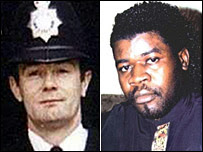http://www.guardian.co.uk/commentisfree/2007/aug/09/comment.societyOn 13th February, BBC News identifed Lambeth as being the home of a quarter of all London's youth gangs. This article is written by a charity worker who works in Lambeth and is in contact with youths involved in gangs.
The latest killings - the vast majority of victims being black - have triggered a flurry of headlines and hand-wringing, but they were going on long before the media cottoned on.
This article highlights some key issues:
* Many youths feel that by them belonging to a gang, they are ensured protection if something goes wrong - to contrast this, they feel that the police won't come to their rescue.
* Inner city youths see gangs as their extented family - they know that they can rely on them in times of need.
* In some cases, people become parts of gangs, due to their family history - brothers, uncles, cousins may all belong to the same gang as they join.
* A Mori poll last year found that 29% of pupils in London schools admitted to carrying a knife, HOWEVER But the young people coming through the doors of our project say that 90-95% of their classmates have taken a knife to school in the past year.
* When asked, a boy of 16 years old, was able to describe what a Mac-10 was, without hestitation. He said what one was (a sub-machine gun), how many rounds per second it can spray (more than 12), and its street price (£800), without pausing.
* Tony Blair claimed that this behaviour wasnt caused by society poverty, but the increase in black gang culture.
* HOWEVER despite the thoughts that more black role models are needed, it is in fact the question of money. The lack of money, has been said to be the root of all of this violence.
* Sharon, the girlfriend of someone who recently got killed, said that money leads to a cycle of robbery - if you dont have the latest goods, then you'll rob people that have them already, yet they've probably stolen them goods in the first place - this cycle continues.
* Lloyd, 16, says that its easier to rob people who live in your neighbour hood, as opposed to people who live in prosperous areas, as they are more likely to call the police, and thus they will get involved. When robbing one of your own kind, officers are less interested.
* The result is a vicious circle of violence and fear, where deprived young people feel exposed and vulnerable, left behind by a rampantly consumerist society they can ill-afford to buy into.
* In many cases youths are forced into this situation due to the lack of things for them to do and their poor backgrounds - parents constantly struggling to make ends meet. This combination causes them to become at a loss as to what to occupy themselves with; however they all know that guns and knives are readily availible, therefore resort to using these.
 http://news.bbc.co.uk/1/hi/england/london/7243742.stm
http://news.bbc.co.uk/1/hi/england/london/7243742.stm
